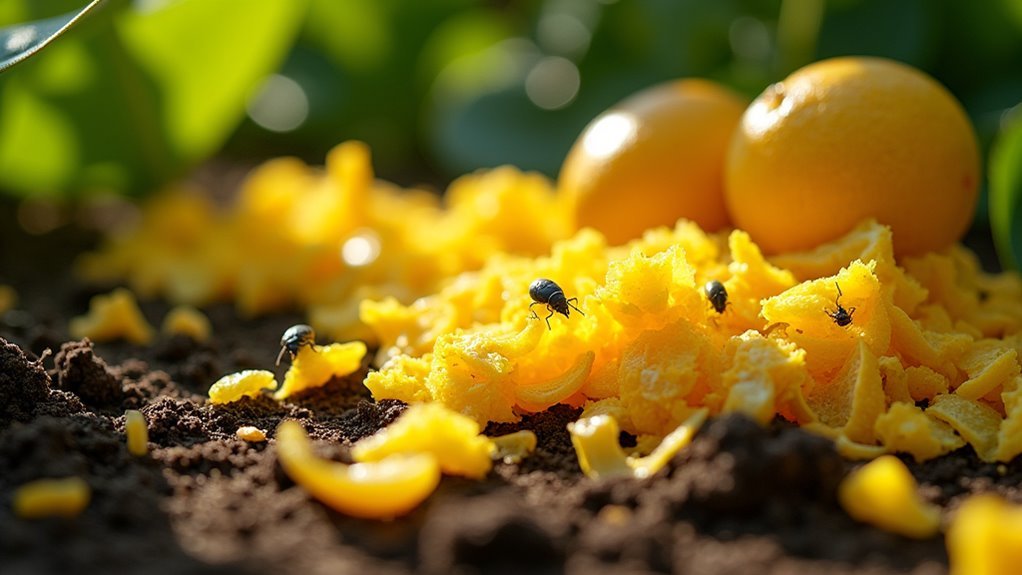You can scatter fresh chopped lemon peels around your plant bases to create an effective barrier against ants and aphids using the citrus scent they hate. Make a nutrient-rich compost tea by boiling two lemons’ worth of peels in one liter of water, then let it cool and sit for three days before applying. Alternatively, use dried crushed lemon peels as a soil amendment to deter soil-dwelling insects while improving your garden’s structure and pH balance for acid-loving plants, discovering additional sustainable techniques ahead.
Scatter Fresh Lemon Peels Around Plant Bases to Deter Crawling Pests

When crawling pests like ants and aphids threaten your garden plants, you can scatter chopped fresh lemon peels around the base of each plant as a natural deterrent. The citrus scent from these peels creates an effective barrier that garden pests typically avoid.
Fresh lemon peels scattered around plant bases create a natural citrus barrier that effectively repels ants and other crawling garden pests.
Essential oils within the lemon peels are particularly potent at repelling crawling pests, making this method an eco-friendly alternative to chemical treatments.
You’ll need to refresh the peels regularly since their effectiveness diminishes as oils evaporate. This natural pest repellent offers additional benefits beyond deterring ants and aphids – as the lemon peels decompose, they’ll gradually improve your soil health by releasing nutrients.
While results may vary depending on specific pest species, this simple technique provides a safe, sustainable approach to protecting your garden.
Create Lemon Peel Compost Tea for Natural Pest Prevention
Creating your own lemon peel compost tea transforms citrus waste into a powerful dual-purpose garden solution that both repels pests and nourishes plants.
Start by peeling two lemons and boiling the peels in one liter of water to extract beneficial nutrients. Once cooled, pour the mixture into a spouted container for easy application.
Let your compost tea sit for three days to enhance its effectiveness as a natural pest deterrent and soil enricher. This organic approach provides essential nutrients while acting as a repellent against unwanted insects.
You can apply this lemon-based prevention method year-round to support various plant types, making your garden healthier through completely natural means.
Use Dried Crushed Lemon Peels as Soil Amendment Against Soil-Dwelling Insects

Transforming your leftover lemon peels into dried, crushed soil amendments creates a natural barrier against troublesome soil-dwelling insects while simultaneously enriching your garden’s foundation.
The citrus scent from dried crushed lemon peels establishes an unfavorable environment that deters various underground pests. You’ll also boost plant health considerably as this soil amendment improves nutrient availability and soil structure.
Acid-loving plants particularly thrive when you incorporate these peels, as they help maintain a balanced pH level. The natural oils create hostile conditions for soil insects while providing essential nutrients like nitrogen, phosphorus, and potassium.
Regular application enhances microbial activity, fostering a thriving ecosystem that supports robust plant growth and natural pest resistance throughout your garden.
Frequently Asked Questions
How to Use Lemon Peels in the Garden?
You can chop lemon peels into small pieces and scatter them around plants as natural pest repellent. Mix them into compost for nutrients, spread over stems for plant health, or dry and crush for soil amendment.
Does Lemon Peel Deter Pests?
Lemon peels can deter some pests like ants and aphids due to their citrus scent, but they’re not highly effective. You’ll need concentrated citrus oils or combined methods for better results.
Why Should You Scatter Sliced Lemons in Your Yard?
You should scatter sliced lemons in your yard because they’ll deter ants and mosquitoes with their citrus scent, improve soil acidity for plants, and attract beneficial butterflies while avoiding harmful chemical pesticides.
Which Plants Benefit From Lemon Peels?
You’ll see acid-loving plants like blueberries, azaleas, and rhododendrons thrive with lemon peels. Roses and tomatoes also benefit from their pest-repelling properties, while flowering plants attract beneficial pollinators through citrus peel enrichment.
In Summary
You’ll find these lemon peel methods work best when you’re consistent with application. Don’t expect overnight results – it’ll take a few weeks to see significant pest reduction. You can combine all three techniques for maximum effectiveness. Remember to replace fresh peels weekly and reapply the compost tea monthly. These natural solutions won’t harm beneficial insects, making them perfect for maintaining your garden’s delicate ecosystem while keeping unwanted pests away.





Leave a Reply